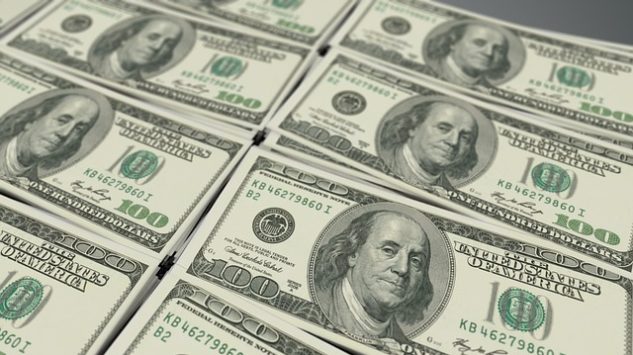Issue Briefs

Towards a Low-Overhead 2020s
October 30, 2019
By Martin Hutchinson
The Western world approaches the 2020s at the top of a boom, with asset prices and leverage at all-time highs and interest rates at all-time lows, yet with disappointing expectations when it comes to a higher standard of living. The extreme policies that have produced this state of affairs are unsustainable over another decade, even if we were mad enough to try. The solution will be unpleasant but inevitable: the overhead “fat” that has accumulated throughout the world economy must be eliminated — a process that will inevitably be painful.
Too much “overhead”
“Overhead” in a business can be defined as expenses of the business not directly relevant to producing or selling its product. The finance department is overhead, so is the legal department, so are the control systems, so is top management. As businesses grow, overhead tends to accumulate disproportionately to the growth in revenues; a good management will be ever vigilant to trim it back. Needless to say, within a large company, expanded overhead elements rapidly develop a powerful constituency of their own.
Perfect formula for increasing value
Beginning in the 1980s, private equity companies developed an infallible formula for increasing the earnings and value of companies they bought: cutting the overhead. Many large companies by the late 1970s had accumulated a vast quantity of unnecessary overhead. This was partly due to the accumulation of regulation over preceding decades. HR departments, for example, were almost unnecessary in 1950.
However, the distortions in corporate results produced by the 1970s persistent inflation also played a role – the costs of inventory, debts and unnecessary real estate were all distorted by the accounting system, so earnings often increased, while underlying profitability remained static or even declined. Thus, hidden gems could be found by eagle-eyed acquirors – the classic example was a company that had acquired its corporate headquarters in 1926 and kept the building in its books at its 1926 cost. By turning a flabbily run company into an efficient one through cutting overhead, private equity fortunes were made.
Lean companies not a good buy
Of course, the corollary of this in the decades that followed was that one should never buy a company that had been owned by private equity. Not only had all the easy overhead savings already been achieved, but necessary long-term investments had generally been neglected in order to make the figures look better.
Today there is too much overhead
In the overall economy today, overhead has accumulated excessively, just as it did in large Fortune 500 companies in the 1970s, and the economy has become bloated and sluggish.
Naturally, government has been a prime instigator and bad example of this overhead bloat. In recent years it has been able to borrow very cheaply indeed, often at interest rates below inflation, while the salutary fear of large government budget deficits has more or less disappeared.
Too much debt
As in the 1970s corporate sector, the absence of previously existing constraints has led to excess. Budget deficits worldwide have soared to levels previously only seen at the bottom of recessions, while debt has followed the upward trajectory. In the United States, there is an increasingly yawning gap between “red states” and blue states” in their level of unproductive overhead, with California, Connecticut and Illinois apparently the most dysfunctional polities.
Too much regulation
The excesses of government do not only include spending, they also include regulation. The world’s reaction to the evidence of very modest global warming has been hugely overblown and gigantically expensive. The EU is the worst culprit here. Its members have egged each other on to hopelessly uneconomic investments in wind and solar power installations (in a continent where the sun has far less electric generating capability than in more cloud-free climes closer to the equator). As a result, Germany now has the highest electricity generating costs in the world and has rendered its magnificent world-beating steel industry completely uneconomic.
Even when they do not force loss-making investments, environmental regulations add huge overhead to the global economy – the incandescent light bulbs fiasco, with its forced purchases of economically suboptimal CFL bulbs, subtracted from the economy’s productivity and provided a significant drag against it in 2008-14. All these environmental, human resources and other regulation costs have together formed a huge burden that the economy of 1969 did not suffer.
Almost the only necessary further overhead expenditure would limit the world’s electrical and electronic exposure to a Carrington Event, a solar flare like that of 1859 wiping out most of the world’s power grid and electronic systems. With no political constituency, that necessary overhead expenditure is not happening.
Additional costs for social responsibility programs and compliance
In the private sector, the Business Roundtable, with its call for companies to prioritize social, environmental and employee needs over profits, is asking for a further explosion in overhead costs. Companies that put non-profit-related objectives ahead of profits incur costs in doing so, and this adversely affects their productivity as well as their profits, forcing them to consume more human, intellectual and environmental resources to produce the same volume of output.
Proliferation of unproductive services
Outside the traditional corporate arena, service industries have sprung up that appear to add nothing to national welfare, but simply sap output. Gambling, always an unproductive human activity, was a minor absorber of resources when it was almost all illegal, but has become a much more important one, more destructive of the lives of the impoverished, now that it is legalized and encouraged by government.
The range of destructive drugs available has proliferated, even as tobacco revenues have been absorbed by the equally unproductive albeit less lethal sector of trial lawyers.
Spectator sports, historically a modest and harmless pleasure for many citizens, have metastasized in the last few decades, absorbing a far higher percentage of output without supplying a noticeably superior or more enjoyable product.
Bloated financial and legal sectors
Within the true business sector, finance, a necessary lubricant of the economy, has swollen in importance and absorption of top talent, while much of its output involves products that add little if anything to the real economy — $544 trillion of outstanding derivatives contracts is at least $534 trillion too much and their trading needs to be scaled down proportionately. Likewise, much of the legal sector is not only unproductive but actively damaging to productivity in the real economy.
Most “unicorns” are not true winners
The unproductive overhead in the economy has now been swollen by the vampiric “unicorns” – billion dollar corporations that suck in finance while making huge losses, year after year for a decade or more. By definition, these companies are not adding value to the economy, they are sucking value out; they need to be shut down.
Massive overhead in Argentina
Internationally Argentina, now about to collapse once again into bankruptcy, is the classic example of a naturally rich country that has allowed the national overhead to bloat until the economy can no longer bear the load. With a very simple “business model” of farming and natural resource extraction, in both of which it has enormous comparative advantages, Argentina had until 1943 an admirably cheap and effective government that allowed it to become one of the richest countries on earth. Then the bonanza of being neutral in a world war with almost infinite demand for its food and resources caused the country’s people to succumb to the allure of socialism. Its national overhead grew exponentially and has never been brought back under control. Result: poverty and misery.
Best cure for economic diseases: eliminate overhead
Andrew Mellon, Treasury Secretary and billionaire controlling shareholder of Alcoa, Gulf Oil and the Mellon Bank, said it best in 1929 to his boss President Herbert Hoover: “Liquidate labor, liquidate stocks, liquidate the farmers, liquidate real estate. Purge the rottenness out of the system. High costs of living and high living will come down. … enterprising people will pick up the wrecks from less competent people.” Hoover, an interventionist to his fingertips, failed to follow Mellon’s strong advice, and the result was the Great Depression.
Mellon was however correct; his “liquidationism” was not a desire to tear down the fixed assets of the U.S. economy, as Austrian economists urged, but an urgent call to eliminate its overhead, which had bloated to unacceptable levels in the easy-money 1920s, (except in government, where Mellon and the previous President Calvin Coolidge had kept a truly admirable lid on public spending). Mellon knew that the fundamentals of the U.S. and global economies were sound.
Malinvestment and mal-operations
Austrian economists analyzing the 1920s talked of a surfeit of “malinvestment” – capital investment gone wrong. Mellon knew that the problem was not simply malinvestment but mal-operations of all kinds, bloating the economy with overhead, inside and outside the corporate sector, and that the solution was to slash overhead, reducing operations to their bare essentials directly responsible for sales and profits. Having done that, those operations would be profitable even in a depression, and once the business cycle turned, they would return to healthy expansion. This need not take long, provided that the overhead liquidation was sufficiently thorough and swift – the depression of 1920-21 lasted less than a year (as did that of 1816-17, liquidating the overhead excesses of the Napoleonic Wars).
Eliminate the bloated overhead
We are now faced with a global overhead bloat worse than that of 1929 – not surprising, because our period of monetary excess has been extreme and our foolish and costly ideas have been more prevalent. The 2020s must see an adoption of Mellon’s solution, either quickly, as policymakers finally come to their senses; or slowly and very painfully for all of us, with policymakers kicking and screaming in futile protest. The choice is theirs; on that choice the happiness of our next decade resides.
The views and opinions expressed in this issue brief are those of the author.
 |
Martin Hutchinson is a GPI Fellow. He was a merchant banker with more than 25 years’ experience before moving into financial journalism. Since October 2000 he has been writing “The Bear’s Lair,” a weekly financial and economic column. He earned his undergraduate degree in mathematics from Trinity College, Cambridge, and an MBA from Harvard Business School.
|
This article was originally published on the True Blue Will Never Stain http://www.tbwns.com